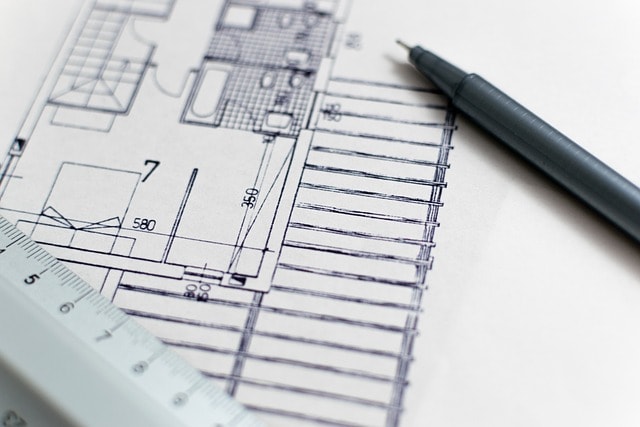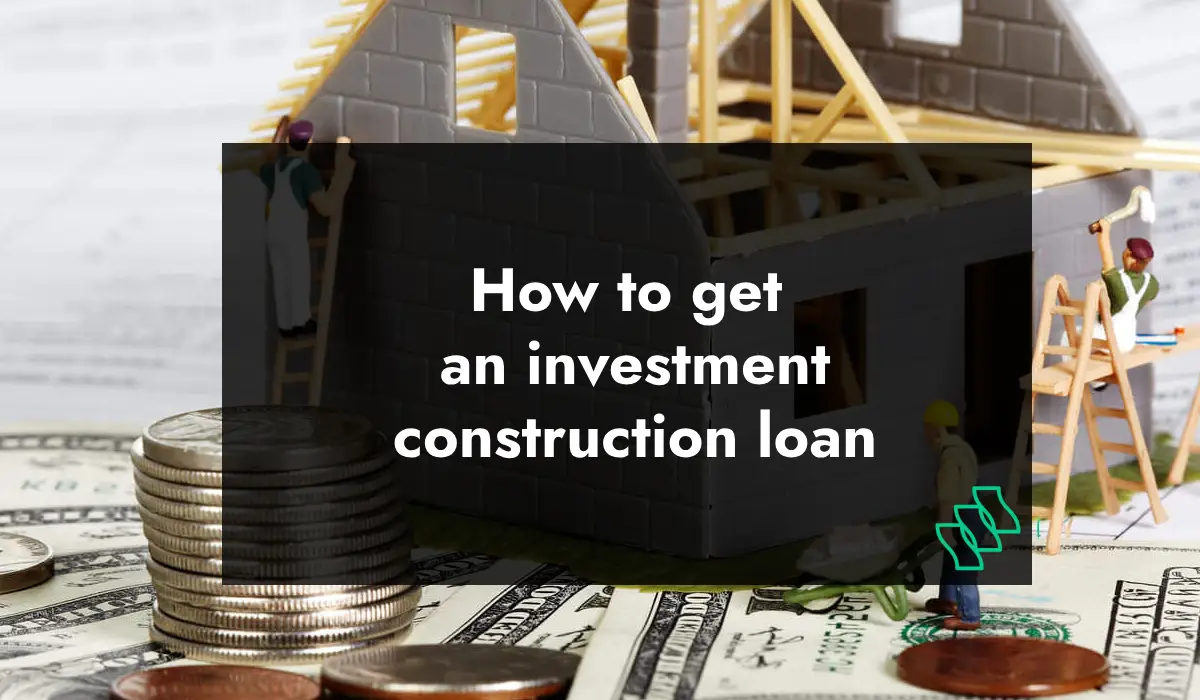Investing in a construction project can be an exciting but daunting journey! Getting the right funding is one of the secrets to investing and building success. This article will break down everything you need to know about investment construction loans, types of capital, eligibility and how they differ from regular loans so you can start investing in that new property today.
What is an Investment Construction Loan?
An investment loan provides funding for building new properties or renovating existing ones for investors or real estate investors who will rent or sell these investment properties out for profit. Unlike regular home loans, these investor loans cover construction-specific costs like project plans, licensed builders, and more.
Related: Best Loans for Construction: Build Your Dream Home in 2024

How Does an Investment Construction Loan Work?
Funds are released in stages as the new loan or renovation loan progresses. For example, you might get funds for the foundation and then additional payments as more work is completed. This loan and payment structure keeps the borrower, investor and lender in sync with the construction plans.
Benefits of an Investment Construction Loan
Why choose a construction loan over other funding options? Here are the top benefits:
- Flexible Fund Release: You only pay for what’s completed, no early loan payments.
- Project-Specific: These loans are for construction, so terms are tailored to your project.
- Potential for Profit: With the right project, the income from renting or selling can be more than the costs.

- Amount = $5,000 to $500,000
- Loan Term = 4 to 24 months
- Interest Rate = 1.11%
4.8
editorial team. We score based on factors
that are helpful for consumers, such as
how it affects credit scores, the rates and
fees charged, the customer experience,
and responsible lending practices.
- Min. Amount = $10,000
- Max Amount = $500,000
- APR = Factor rate starting at 1.11%
4.8
editorial team. We score based on factors
that are helpful for consumers, such as
how it affects credit scores, the rates and
fees charged, the customer experience,
and responsible lending practices.
Best for large business loans

- Loan Amount = $25,000 - $3,000,000
- $10,000 in Monthly Rev
- No minimum credit score requirement
4.9
editorial team. We score based on factors
that are helpful for consumers, such as
how it affects credit scores, the rates and
fees charged, the customer experience,
and responsible lending practices.
Best for large business loans

- Min Amount = $5,000 - 1,500,000
- APR range Not disclosed
- Minimum Credit Score 570
4.7
editorial team. We score based on factors
that are helpful for consumers, such as
how it affects credit scores, the rates and
fees charged, the customer experience,
and responsible lending practices.
Best for Small business loans

- Min Credit Score = 620
- Loan Amount = $10K-$5M
- Term = 6 months - 10 years
- APR = Variable
4.8
editorial team. We score based on factors
that are helpful for consumers, such as
how it affects credit scores, the rates and
fees charged, the customer experience,
and responsible lending practices.

- Check Your Eligibility
- Get $10K to $2M
- 24/7 Support
4.8
editorial team. We score based on factors
that are helpful for consumers, such as
how it affects credit scores, the rates and
fees charged, the customer experience,
and responsible lending practices.

- Amount = $10,000 to $1,000,000
- Factor Rate = Starting at 1.24
- Term = 2 to 12 months
4.7
editorial team. We score based on factors
that are helpful for consumers, such as
how it affects credit scores, the rates and
fees charged, the customer experience,
and responsible lending practices.
Types of Investment Construction Loans
Here are the most common building loans for investors and real estate investors from banks:
New Construction Loans: For projects that are starting new construction from scratch. These new building loans cover construction financing in all stages of building a new property.
Renovation Loans: To convert existing properties and new structures into investment-ready units for renovation projects.
Flip Loans: For investors and borrowers who want the funds to finance, buy, construct or renovate and sell quickly.
Permanent Loans: Once you’ve completed a new construction loan, some loans can be converted to purchase a permanent mortgage.

Who is eligible for an Investment Construction Loan?
Eligibility for an investment project or property construction loan includes:
A good credit score shows you’re reliable to lenders.
Lenders require a 20–30% deposit.
Having project plans and a licensed builder increases the chances of approval.
A lower debt-to-income ratio means you’re more financially stable, which lenders love.
Before You Apply
When looking at investment properties or property properties, you should consider the following:
- Costs: From materials to labour, know all the costs before finalising your budget.
- Interest Rates: Interest rates are higher than regular loans.
- Project’s Construction Plans: Plans for each stage of construction.
- Financial Information: Lenders require full financial information and proof of income and assets.
New Construction Loans vs Renovation Loans
If you’re deciding between new construction loans and renovation loans here’s a quick summary:
- New Construction Loans: For building a property from scratch.
- Renovation Loans: For investment projects on existing properties that need renovations.
How to Apply for an Investment Construction Loan
Ready to start your next project? Here’s how to apply for a new construction loan or financing loan:
- Finalise Your Project Plans: Make sure your project has clear and achievable goals.
- Choose a Lender: Research banks and lenders that offer construction financing for investment properties.
- Submit Documents: Include income, assets and credit check reports.
- Property Inspection: This step ensures the investment site meets lender requirements.
- Final Loan Approval: Once all documents are reviewed, you’ll get final loan approval.
Financing Options for Real Estate Investments
When choosing financing options, consider the project and your financial situation. Here’s a look:
- Regular Mortgages: If you plan to hold the property as a rental.
- Construction or Renovation Loans: For new builds or renovation projects.
- Flip Loans: For quick buy, quick sell strategies.
Why Real Estate Investors Choose New Construction Loans
Investors in today’s real estate finance and capital market choose to finance new construction loans for:
- A new build allows investors to meet market demands for modern features.
- Newer properties can get higher rents or sale prices than older homes.
- New builds allow for energy-efficient designs, so future homeowners or tenants will save costs.

Approval Requirements for Investment Construction Loans
Typical requirements for new construction and loans are:
- Good Credit Score: A higher score means you’re a safer investment for lenders.
- Project’s Construction Plans: Plans show the project is viable.
- Deposit: Construction loans require a big deposit.
- Debt to Income Ratio: A lower ratio means you’re more financially stable.
Construction Loan vs Mortgage
When comparing a construction loan to a traditional mortgage, think:
- Loan Purpose: A construction loan is for building costs, and a mortgage is for completed homes.
- Disbursement: Construction loans are in stages, and mortgages are lump sums.
- Terms and Interest Rates: Mortgages have fixed rates, and construction loans have variable rates.
Related: Tractor Financing with Bad Credit: A Complete Guide
Investment Property Construction Loans
For real estate investors, investment property construction loans offer financing for building from scratch or renovating structures. By understanding the differences between loan types and requirements, investors and borrowers can choose the investment property construction loan that suits their needs.
Licensed Builder in Your Project
A builder can increase your chances of home loan approval and project quality. They ensure the work is done to code and budget, giving lenders more security for home loans.
Final Approval
Once you’ve met all the approval requirements and submitted your documents, your loan will undergo a final review. This last step involves making a down payment, obtaining other financial information, and ensuring all documents meet the lender’s risk and reward criteria.
Investment Construction Loans Challenges
While beneficial to both investors and borrowers, investment property construction loans typically come with risks:
- Fluctuating rates can blow your budget.
- Weather, permits or materials can slow down the work.
- Changes in the real estate market can affect property value post-construction.
Repayment Terms and Closing
After completion of a new property inspection and construction loan, loans can either be repaid in full or converted into a mortgage. Here’s what to expect:
- Permanent Loan Option: Some loans convert into a mortgage with fixed rates.
- Closing Fees: Like regular mortgages, there are fees for closing and title insurance.
Getting a construction/renovation loan can be a key to profitable property investments. By understanding loan types, approval requirements and potential challenges you can get more financial information to make informed decisions that suit your goals next project. Remember the lender’s expectations, be prepared for delays and manage your budget for your next investment project.

Frequently Asked Questions
Is a construction loan harder to get than a mortgage?
Construction loans are used to purchase or build homes. They can be converted to mortgages after the construction or renovation loan is finished. Construction loans typically have stricter conditions and higher interest rates than regular mortgages.
How much equity do I need for a construction loan?
If the home is appraised at the same purchase price you want to build, you can get a loan for 80%. If the property value exceeds the purchase price, the lender will lend 85% or more. You can also borrow funds from other banks to pay for your construction.
What is a portfolio construction loan?
Portfolio loans are loans that lenders buy, originate or retain instead of selling or securitising to the secondary mortgage market. A portfolio loan is deposited in a bank’s loan book for a period. August 9th.
Can I use SBA loan for construction?
The 574 SBA loan is one of the best commercial loans for home builders, real estate market, and small business owners looking to buy commercial properties for their business. But is it for homeowners who want to renovate or build new homes?


 Read More
Read More 




